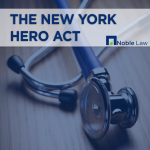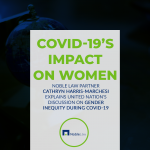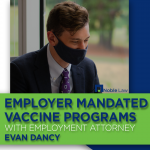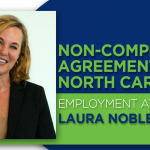Fair Chance Act Expands Protections for NYC Workers with Criminal Records

For jobseekers with a criminal history, workplace discrimination is a real problem. The ability to gain lawful employment, receive income, and contribute to society is necessary to end the cycle of recidivism. Fortunately, the New York City Council recently expanded protections for local workers with criminal records to reduce unfair discrimination. What is The New York City Fair Chance Act? The New York City Fair Chance Act (FCA) took effect in October 2015. It states that employers cannot: Amendments to …
Read More »
NY Dept. of Labor Issues New Guidance on Paid COVID-19 Leave
On January 20, 2021, the New York Department of Labor (NYDOL) issued new Guidance for employers regarding the NYS COVID-19 Sick Leave Law enacted in March 2020. With this recent change, employers and employees alike need to be aware of their revised obligations and rights. Employees are eligible to receive up to three rounds of paid COVID-19 leave These scenarios play out in several ways, and there are limitations. Here is a general overview of the DOL’s new Guidance for …
Read More »
Understanding Employment Unions in New York
Employment unions exist to help individual employees contend workplace matters without having to go to an attorney. However, there are circumstances in which an employee might require an attorney in tandem or after contacting their union. In today’s Noble Notes audio blog, Lead New York Attorney Cathryn Harris-Marchesi explains the union grievance process, collective bargaining agreements, discrimination claims, and filing deadlines. Termination, failure to promote, unequal pay, or any other workplace matters that conflict with a union’s collective bargaining agreement …
Read More »
The New York HERO Act

On April 21, 2021, the New York Health and Essential Rights Act, also known as the NY HERO Act, passed both houses and now awaits the signature of Governor Cuomo to become law. The NY HERO Act aims to provide industry specific health protections to all workers. The Act will require all businesses to follow and adopt COVID-19 protection protocols to protect workers from airborne illnesses or face fines. Employers who fail to adopt a relevant plan will be subject …
Read More »
The Global Impact of COVID-19 on Women

Alongside being a partner and lead New York attorney at The Noble Law, Cathryn Harris-Marchesi is an active member and United Nations delegate with the Commission on the Status of Women (CSW) in New York, which focuses on worldwide issues related to women, children, and gender. After the CSW’s sixty-fifth session (CSW65) at the United Nations in New York, and intense set of high-level discussions lasting two weeks, March 15 through March 26 2021, New York is about to issue …
Read More »
Employer Mandated Vaccine Programs

Following up on his discussion with WRAL, associate employment attorney Evan Dancy further explains the implications of employer-mandated vaccine programs. Topics of Discussion: Can an employer institute a vaccine mandate to their employees? What protections are given to employees under the ADA? What if an employee has a disability that prevents them from receiving the vaccine? What is an employee has a sincerely held religious belief that prevents them from receiving the vaccine? Are there any practical considerations employers should …
Read More »
Non-Compete Agreements in North Carolina

Employment attorney Laura Noble kicks off our new Noble Notes audio blog series with a discussion on non-compete agreements in North Carolina. To be considered eligible in North Carolina, non-compete agreements must be in writing, reasonable in time and territory, of valuable consideration, and for the company’s legitimate business interests. Topics of Discussion: Do you need legal personal assistance on an employment matter related to a non-compete agreement? If you have been provided a new non-compete agreement and would like …
Read More »
Concerted Activity Under the National Labor Relations Act During Covid-19
Enacted in 1935, the National Labor Relations Act (NLRA) protects the rights of employees and employers. The NLRA encourages collective bargaining and aims to protect the welfare of workers and businesses from certain damaging employment practices. The NLRA is enforced by the National Relations Labor Board (NLRB). This federal agency protects employees and employers from unfair labor practices, including by investigating any complaints and charges related to unfair labor practices. The NLRB is made up of five members who are …
Read More »
First Amendment Right to Free Speech in the Employment Context
Recently, there has been an abundance of discourse surrounding the topic of free speech under the First Amendment of the United States Constitution. Very few seem to understand, or remember, that the United States Constitution was written with the sole intent to protect private individuals from overreaching actions performed by the Government, whether federal, State, or local. Therefore, the Constitution only applies to Government actions against private individuals. In the employment context, this means a private employer can restrict the …
Read More »
Remote Work as a Reasonable Accommodation Under the ADA During COVID-19
Remote Work as a Reasonable Accommodation Under the ADA During the COVID-19 Pandemic When it comes to reasonable accommodations under the ADA during the COVID-19 pandemic, remote working may or may not qualify. On September 8, 2020, the Equal Employment Opportunity Commission, or the EEOC, stated that businesses are not required to automatically allow an employee to work remotely as a reasonable accommodation under the ADA. Whether remote working arrangements are reasonable accommodations is a fact-specific inquiry that should be …
Read More »

